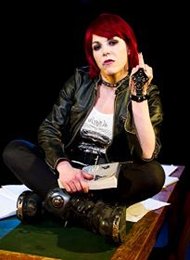Under Ruth Calder-Potts' direction, Company D's simple, sleek production of Mamet's Oleanna captures the complex power play between the two characters intriguingly well. In the first of three scenes, the college professor, John (David Scott) arrogantly claims that it is his job to provoke Carol (Sinéad O'Riordan), his student. In the second scene, he has changed his claim. It is now his job, he asserts, "to tell you what I think". By the tense third scene, it is his job, he now announces "to say no to you". This change in his own perception is a reflection – a refraction of the changing perspectives of the play. Each scene lies open to our interpretation; each character plays with our impressions of them.
 Sinéad O'Riordan delivers a very strong performance throughout, achieving an awkward fragility in physicality and voice in the first scene which belies her confident, punky appearance. While it is the professor who dominates the airwaves in this scene, he seems not to be present, continually dealing with phone calls and returning to his discussions with his student with an affected air. The phone calls, and Carol's subtle but engaging reactions to them bring into focus a very pertinent modern situation. Particularly in an era where mobile phones are ubiquitous, a dialogue is often not a dialogue, and the dynamic of the unpresent third party/parties is powerfully portrayed as a disruptive force in the flow of genuine human interaction and relationship. It is interesting to note that even in asserting the power by rudely answering the phone (while a physically present human being requires his attention), John quickly loses that power through his inability to control the phone conversation or the situation he is in: "I can't talk right now" – and yet he repeatedly attempts to do just that, while failing to communicate at all. David Scott's portrayal of the character flirts with comedy but retains a centre of vulnerability, underlined by the gradual dishevelling of his costume during the tense, slowly pulsing lighting changes of the scene breaks.
Sinéad O'Riordan delivers a very strong performance throughout, achieving an awkward fragility in physicality and voice in the first scene which belies her confident, punky appearance. While it is the professor who dominates the airwaves in this scene, he seems not to be present, continually dealing with phone calls and returning to his discussions with his student with an affected air. The phone calls, and Carol's subtle but engaging reactions to them bring into focus a very pertinent modern situation. Particularly in an era where mobile phones are ubiquitous, a dialogue is often not a dialogue, and the dynamic of the unpresent third party/parties is powerfully portrayed as a disruptive force in the flow of genuine human interaction and relationship. It is interesting to note that even in asserting the power by rudely answering the phone (while a physically present human being requires his attention), John quickly loses that power through his inability to control the phone conversation or the situation he is in: "I can't talk right now" – and yet he repeatedly attempts to do just that, while failing to communicate at all. David Scott's portrayal of the character flirts with comedy but retains a centre of vulnerability, underlined by the gradual dishevelling of his costume during the tense, slowly pulsing lighting changes of the scene breaks.
The simple playing area – two chairs and a table – is surrounded by black flats across which are chalked words and sentences. The words appear handwritten, a silent evocative stream as a backdrop to Mamet's torrents of spoken words: "society", "students", "hierarchy", "culture", "authority" – the words effectively echo the play at any moment when our eye chooses to stray to them. We naturally seek patterns and connections; these simple chalked words offer us many opportunities, while demanding nothing.
If John's tagline concerns the function of his job, Carol's mantra changes from "I don't understand" to "Do you see?" – a question played aggressively and threateningly by the third scene. Here, O'Riordan manages to play upon a knife's edge of fragility and feistiness. Her performance makes Carol's complexity and apparent fickleness utterly convincing.
What makes the play intriguing is that we are witnesses to the three significant interactions between the characters. In most cases of sexual harassment, the word of the harassed victim must be respected. If s/he feels harassed, s/he is considered to have been harassed, though in many cases the only witnesses are the two parties involved. In this case, however, we are in the room - we actually witness the interactions of the characters and their interpretations of what happened must compete with our own. This is of course the genius of the play. When played with conviction and intelligence, as it is in this production, this voyeuristic dilemma is still fresh.
Síle Ní Bhroin